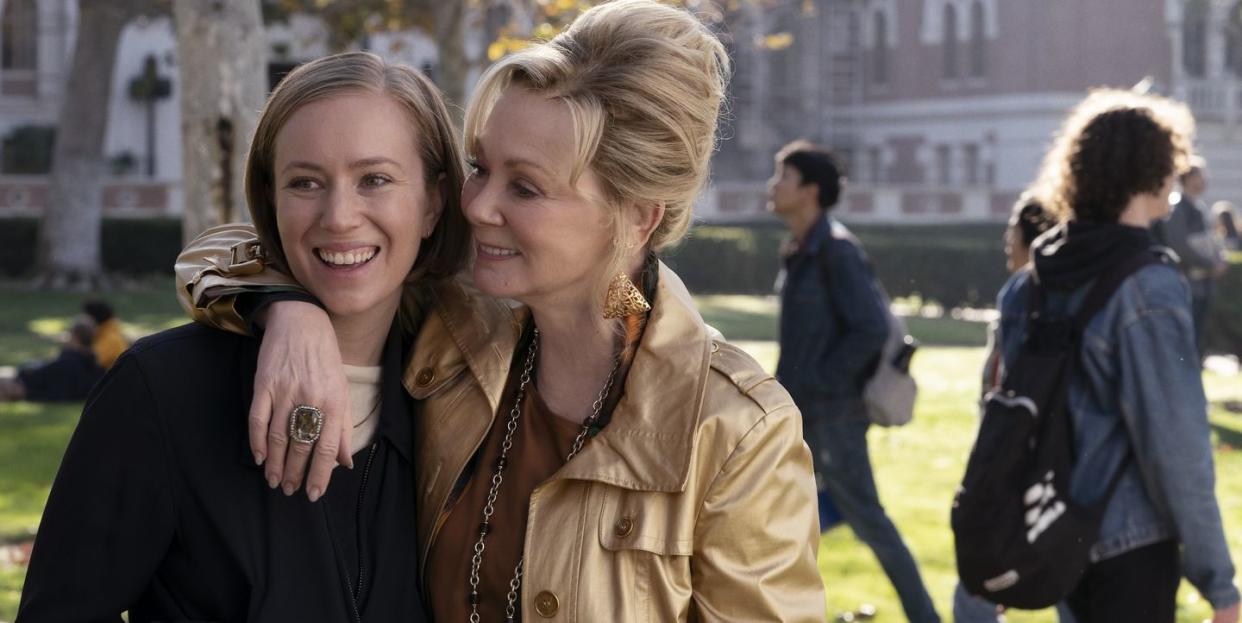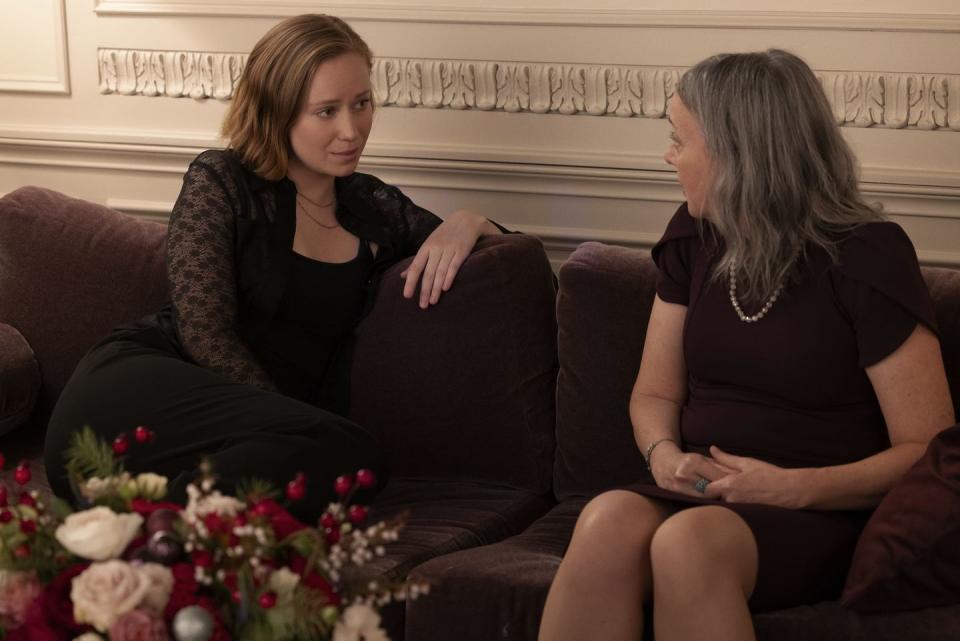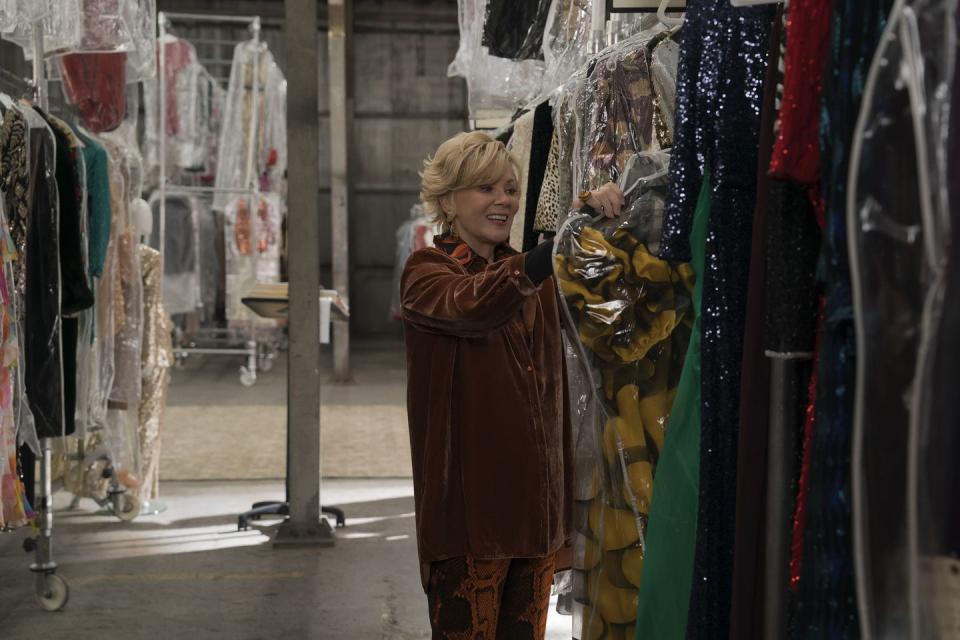On TV, Jean Smart and Hannah Einbinder are often at odds. In real life? They couldn't be closer

For three seasons, Hacks has skewered the ageism and sexism – and many other isms – built into the cogs of the Hollywood machine. It has also poked fun at the struggles of a new generation of show-business hopefuls trying to remake the industry in their more evolved image (to mixed success). The odd couple at the centre of the hit comedy has always embodied that culture clash: the brassy veteran stand-up Deborah Vance (played by Jean Smart, who’s won two Outstanding Lead Actress Emmys for the role) and her squishy, well-meaning comedy writer, Ava Daniels (played by the real-life comic Hannah Einbinder).
But while the show can be cutting (the latest season, centred on Deborah chasing a late-night hosting gig that eluded her decades earlier, is its sharpest yet), the relationship between Deborah and Ava has always been its deceptively warm and fuzzy heart. Under all the quips and commentary, Hacks is in part a platonic love story about two people who butt heads, but who need each other and make each other better.
As Hacks reaches its third-season finale, Smart and Einbinder put their own friendship on display to talk about the show’s close-knit set, Einbinder’s upcoming comedy special, and the lessons Smart has learned from a her impressive career in television.
A constant thread throughout Hacks has been the ups and downs of Deborah and Ava’s relationship. You’re like the Ross and Rachel of platonic, intergenerational comedy partners. But how has your own relationship changed over these three seasons?
Jean Smart: She doesn’t idolise me anymore.
Hannah Einbinder: Shut up, that’s not true! [Laughs.] I think the nature of our relationship was inherently one of quick closeness. Jean went out of her way to make me feel comfortable very much off the bat — and then every day since. So I feel like we’re now the way we always have been, and that relationship just continues to deepen.
Even before I ever met her at our initial screen test, she got my number from the producers and called me to calm my nerves. And we had never met. She just doesn’t allow you to freak out in a sustained way, because she just pulls you in under her wing instantly.
JS: Like a big ol’ chicken.
HE: Yeah, like a mother hen.
JS: I’m just so proud of her. I mean, my God, her career’s soaring. And now she’s got her own special. My baby!
Jean, you seem to have been part of a lot of close-knit casts. You were on Designing Women for five seasons. You began guest-starring on Frasier seven seasons in, and have talked about how much fun the cast was having even after so many years. Have you ever experienced the opposite?
JS: Knock on wood, I’ve never been on one of those sets where it’s just a nightmare. I have people close to me who had to work on shows where it just sounded intolerable, and I don’t know how they went to work every day. I have never had that experience. But yes, there are some shows that are just very different, Frasier being being one of them. Part of it was because some the cast and writers came from the theatre world, and theatre people have a very different attitude towards their co-workers. When you’re in live theatre, you’re all in the same boat; you need each other really badly, and you have to trust each other implicitly. So I think that was part of it. But part of it was just their personalities. When you have that, it’s kind of magical. I remember commenting to one of the producers, “They’re all just so close. They watch each other’s scenes and they hang out on set between takes while David [Hyde Pierce] plays the piano….” And the producer said, “I know. It’s weird, isn’t it?”
Is anyone playing the piano between takes over at Hacks?
JS: If we had a piano, we probably would be.
HE: I think that’s just the case when comedy people are in a room. Everybody who works on this show is a performer.
JS: And we’ve got a couple of crew members that are at least as funny, and I’m not kidding, as any of the actors.

Who’s breaking the most on set?
HE: I mean … me. Especially when I’m in a scene with Jane Adams [who plays Einbinder’s onscreen mother, Nina]. I dare any of y’all to fucking get in a scene with her. It is unhinged mania. It is a raw nerve. And by the way, it’s not just while we’re rolling. We’ll finish the scene and she’ll keep going.
JS: She’ll go on about saffron for five minutes. Or Amway.
HE: Just, like, anything. And I’ll be trying not to combust.
Saffron and Amway. That’s … specific.
HE: She just fully becomes Ava’s mom. It’s really, really bizarre.
Hannah, you recently shot a stand-up special for Max.
HE: Yeah, I’m excited. It’s my first stand-up special, the cumulative result of years of work.
JS: Does it have a title yet? I forget.
HE: It does. It’s called Everything Must Go.
JS: Like a big sale? Like Filene’s Basement?
HE: Yeah, and, you know, all of us, eventually.
JS: [Deadpan.] Oh, that’s lovely.
HE: [Bursts out laughing.]

How long has the special been percolating?
HE: Basically since I started comedy, but I began to make more of a concerted effort on ironing out an hour maybe three-ish years ago. As a local comedian in LA, we really don’t get a lot of long sets — maybe eight minutes, 15 minutes, max. It’s very rare that you’re able to stretch and work out. But when I started acting on Hacks, I got more opportunities to tour and to work out for more than 15 minutes. So I just started writing and trying to fill out that time. I’m excited to share it.
Did being on a show that is so much about the process of writing stand-up comedy help or hinder your writing?
HE: It definitely helped. I think it only made my performance style as a stand-up comedian more confident. I’ve always had a theatrical performance style, and it only deepened my commitment to that.
There was a scene early in the third season in which Deborah visits her own personal storage warehouse of archival outfits she’s kept over her long career. Jean, you’ve had an iconic career in Hollywood yourself. Did you keep any outfits that have special meaning for you now?
JS: Well, most of the things you wear on the red carpet are loaned to you. And, I mean, where else am I going to wear that stuff? Most of the time, I’m just in Skechers and jeans. But there was one time when my oldest son was little, I don’t know what possessed me to buy this dress — it was purple with lace sleeves and a big skirt. I wore it to present some little thing many moons ago. And my little boy, Connor, was about six or seven at the time. He went, “Mommy, you look so beautiful!” And he asked me to take him to Burger King and wear the dress. And I said, “Oh, honey, no. I can’t do that.” I thought, if anybody recognised me — I wasn’t that recognisable back then, but I was recognised fairly often — people would think, “You’re pathetic! You don’t get enough attention, you have to wear that to Burger King?” And then years later, I realised I should have done it. How often is your little boy going to ask you something like that? I feel bad that I missed that opportunity. Now, of course, if I wore that out with one of my sons, they’d die.
Jean, I’ve been thinking a lot about your friendship with the late, great Dixie Carter. She used to joke that she was the only Republican in show business. But she played a very liberal character on Designing Women, a sitcom created by very liberal showrunners, cast with very liberal actors. And despite your differences, you were such wonderful friends; you got married in her backyard. You loved each other and set aside politics. Are we forgetting how to do that?
JS: We are totally forgetting how to do that. But one of the problems, I think, is that since we had President Trump in office, the dividing lines have become like the Grand Canyon. There’s no subtlety anymore, there’s no reaching across the aisle, there’s no, “Maybe I get what you’re saying.” It’s just a massive chasm. So that I don’t — maybe Dixie would now be a Democrat. [Laughs.] Maybe! That reminds me — she had that wonderful speech on [an episode of Designing Women], where she chews out Trump on the phone. It was very funny.
But anyway, you hear about people that are married, and one’s a Republican, one’s a Democrat. I don’t get that. I don’t know how that works, not anymore. Because now with politics the way they are, your politics aren’t just your opinion, or whatever, they’re everything about you as a human being. I just can’t fathom how people can make that work you know, in any kind of a relationship.
It’s hard to imagine losing out on a friendship like the one you had with Dixie because of political polarisation.
JS: Oh, I can’t imagine ever losing that friendship. I adored her. Back then, for better and for worse, politics weren’t part of our everyday conversations, so they weren’t necessarily a part of your interpersonal relationships. I mean, I was brought up a Democrat, so that’s probably one of the reasons I am a Democrat. But I also know people who were brought up very conservative who have rejected the way they were brought up. But right now, it really is, “You’re either for me or against me,” and it’s too bad. That’s really too bad.
This interview has been edited and condensed for clarity.
You Might Also Like


